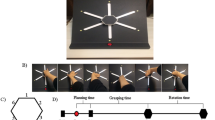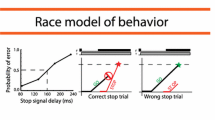Abstract
Patients with unilateral neglect following right hemisphere damage may have difficulty in moving towards contralesional targets. To test the hypothesis that this impairment arises from competing motor programs triggered by irrelevant ipsilesional stimuli, we examined 16 right hemisphere patients, eight with left visual neglect and eight without, in addition to eight healthy control subjects. In experiment 1 subjects performed sequences of movements using their right hand to targets on the contralesional or ipsilesional side of the responding limb. The locations of successive targets in each sequence were either predictable or unpredictable. In separate blocks of trials, targets appeared either alone or with a simultaneous distractor located at the immediately preceding target location. Neglect patients were significantly slower to execute movements to contralesional targets, but only for unpredictable movements and in the presence of a concurrent ipsilesional distractor. In contrast, healthy controls and right hemisphere patients without neglect showed no directional asymmetries of movement execution. In experiment 2 subjects were required to interrupt a predictable, reciprocating sequence of leftward and rightward movements in order to move to an occasional, unpredictable target that occurred either in the direction opposite to that expected, or in the same direction but twice the extent. Neglect patients were significantly slower in reprogramming the direction and extent of movements towards contralesional versus ipsilesional targets, and they also made significantly more errors when executing such movements. Right hemisphere patients without neglect showed a similar bias in reprogramming direction (but not extent) for contralesional targets, whereas healthy controls showed no directional asymmetry in either condition. On the basis of these findings we propose that neglect involves a competitive bias in favour of motor programs for actions directed towards ipsilesional versus contralesional events. We suggest that programming errors and increased latencies for contralesional movements arise because the damaged right hemisphere can no longer effectively inhibit the release of inappropriate motor programs towards ipsilesional events.
Similar content being viewed by others
Author information
Authors and Affiliations
Additional information
Received: 1 October 1996 / Accepted: 21 October 1997
Rights and permissions
About this article
Cite this article
Mattingley, J., Corben, L., Bradshaw, J. et al. The effects of competition and motor reprogramming on visuomotor selection in unilateral neglect. Exp Brain Res 120, 243–256 (1998). https://doi.org/10.1007/s002210050398
Issue Date:
DOI: https://doi.org/10.1007/s002210050398




